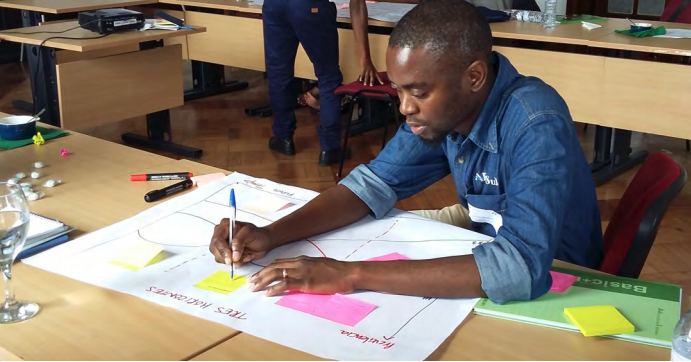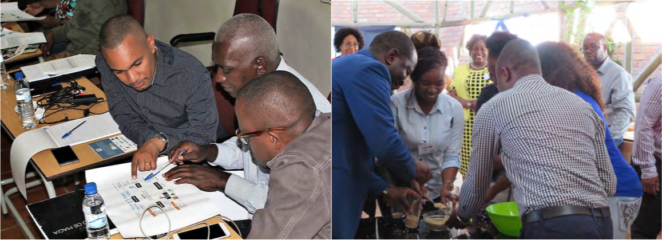Receptivity and judgement: expanding ways of knowing the climate to strengthen the resilience of cities

Summary
In this working paper the concept of receptivity is presented as a way of understanding what is needed for people to be able to open themselves up to engaging with and assimilating different perspectives, frames of reference, values and interests that others bring. Receptivity goes further than simply opening up. Receptivity entails actively and critically reflecting on one’s own knowledge and that offered by others (i.e. recognizing various assumptions and framings). This forms the basis for expanding or enhancing one’s ability to make less partial, narrow judgements, and to shift ones practices and actions based on a broader view of the system and what changes are underway and are sought (by individuals, organisations and collectively).
This paper also discusses how receptivity can enhance the co-production of actionable climate information and the use thereof in making decisions about urban development and management. Read about the FRACTAL principles of transdisciplinarity, co-production and co-exploration. weADAPT hosts a range of articles related to co-production, which can be accessed below:
- Building resilience in southern African cities,
- Co-producing climate knowledge,
- Tearing down the ivory tower and
- Co-producing climate information for Windhoek decision making.
- Read this guide on how to establish transdisciplinary learning processes and co-production of knowledge.
Introduction
The authors propose the concept of receptivity as an important theoretical concept for thinking about the relationship between knowledge and decision-making in cities.
Their hypothesis is that it is crucial to understand the receptivity of various actors, both researchers and decision-makers, to the process of including climate considerations into political and technical decision-making through incorporating alternative frames of reference.
The governance research undertaken in the FRACTAL project aims to interpret the extent to which actors exercise agency and reflective judgement in processes of producing and applying climate information in the pursuit of decisions and actions that make cities more climate resilient.
The text below provides an overview of the key messages from this paper. See the full text for more detail.
Receptivity in the FRACTAL Project
The Future Resilience of African Cities and Lands (FRACTAL) project focuses on climate change and cities in Southern Africa, with an emphasis on how scientific climate infromation is used to make decisions regarding water and energy provision and management. As part of the FRACTAL research agenda, the following questions are asked about the ‘decision-making space’:
- What are the ‘burning issues’ faced in each city and what climate-sensitive decisions are being made?
- What kind of climate information is relevant to and needed for different types of decisions?
- Who are the actors who would need to be involved in producing and applying such climate information?
- Which policy and legislation lacks inclusion of climate change considerations and which do not?
- What are the ‘entry points’ for integrating climate information into decision-making processes?
Learning Labs
The Learning Labs run 2 or 3 times a year in each of the cities involved in the FRACTAL project are participatory, co-production forums where representatives of the FRACTAL team and other city stakeholders (including international climate scientists, local university researchers, the municipal government departments, and civil society organisations) engage to share existing knowledge and produce new knowledge to contribute to addressing local ‘burning issues’ or climate-sentivie decisions facing the city.
The Working Paper proposes that it is through these collaborative processes that mutual learning takes place and climate change information is shared and worked through in ways that relate it to contextual issues and prospective decisions being grappled with.

Through the FRACTAL experience, climate scientists engaged in the Learning Labs have reflected deeply on the process of climate science itself. There has been a strong recognition of the subjective nature of many decisions and assumptions made in the process of constructing climate information. This is evident in the proliferation of climate information services, online portals, climate information profiles and fact sheets, that draw on different sets of data, make different choices about models, scenarios and variables, and often produce different findings and key messages. The result is a confusing and overwhelming landscape of inconsistent information which does not create a sense of confidence and clarity in decision-makers.
The Learning Labs held within this project provide evidence that the collaborative processes have facilitated the receptivity of the participants – researchers, politicians, technicians and residents – to different ways of thinking about the linkages between urban issues and the climate and what actions are needed to strengthen climate resilience.
Conclusion
- This working paper aims to introduce an alternative way of conceptualising how climate information is integrated into decision-making. It shifts attention away from finding ‘entry points’ for inserting information towards the quality of relationships and engagement processes needed to bring together the work of scientisits and decision-makers in co-productive ways.
- Literature from political science, ethics and philosophy provide concepts related to receptivity and judgement in democratic engagements suggesting that actors are not passive receptors of information but rather have agency that makes them receptive to, and be able to judge and act on new information from other actors with different frames of reference as well as working collaboratively to contribute to new knowledge and different decision outcomes.
- Receptivity to other frames of reference is in no way passive. Rather it is a stance, a way of engaging, thinking and acting in relation with others that is open and considered, with a willingness to share, to let go, to take on and arrive at new insights and new ways of thinking and being.
- By participating in Learning Labs many researchers and decision-makers have increased their receptivity to co-producing climate information and co-exploring the use of that information in various decision processes. In many sessions reflections have revealed that the activities in the Learning Labs have been ‘a new way of engaging compared to the usual workshops’; they are ‘exciting and interesting’; they ‘allow participants to speak their minds’; and the learning ‘has changed their view of the world, not only at work but at home too’.
- In the context of FRACTAL, this suggests that facilitating opportunities to increase receptivity is a crucial part of making more climate compatible and climate resilient judgements and decisions that impact development pathways of cities.
Suggested Citation
Scott, D. and Taylor, A. (2019). Receptivity and judgement: expanding ways of knowing the climate to strengthen the resilience of cities. Future Resilience for African CiTies and Lands (FRACTAL).
Related resources
- FRACTAL: Future Resilience for African Cities and Lands
- FRACTAL website
- Transdisciplinarity, co-production, and co-exploration: integrating knowledge across science, policy and practice in FRACTAL
- Building resilience in southern African cities
- Co-producing climate knowledge
- Tearing down the ivory tower
- Co-producing climate information for Windhoek decision making
- A guide to Effective Collaboration and Learning in Consortia
(0) Comments
There is no content